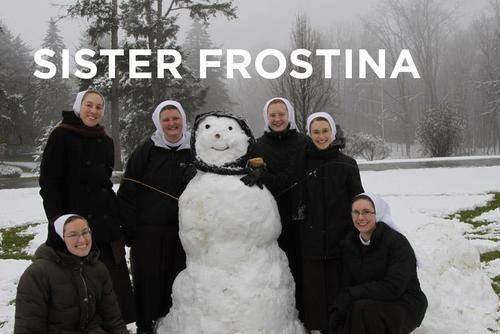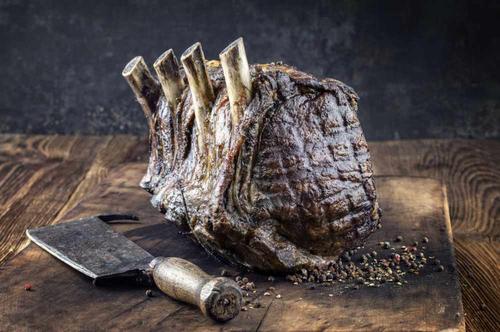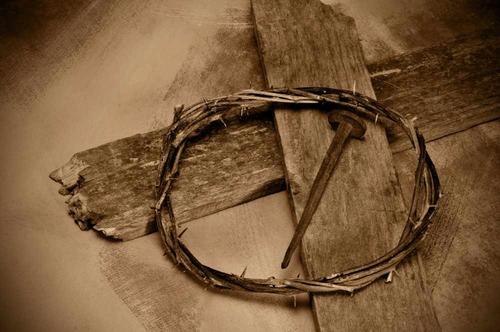April 2017
Volume II/ Issue 13 / April 2017


From the Editorial Desk:
We are asking God to bless and keep all of us in His Holy Will this Holy Week and until the end of the world. The following story taken from the Directorium Asceticum, reminds us of the importance of being in God's Holy Will just as Christ in the garden struggled with God's Holy will when He said, "Not my will but thine be done."
An aged Monk fell into a grievous illness, and seeing that the other monks took so much trouble for the recovery of his bodily health, he resolved to withdraw from the solitude, and to go and seek relief from his malady in Egypt, in order to spare his brethren so great an inconvenience as that of nursing him. "Do not go," said Abbot Moses to him; "you will run the risk of some grievous fall." He laughed at this warning, relying on his age and virtue, and replied to his Superior, that he could see no danger, as, being in a decrepit old age, the incentive to lust was now dead in him; and that the virtuous habits of a long life, spent chastely, rendered him proof against temptation. He therefore took his departure. On arriving, he was kindly received by the inhabitants of the place, and supplied with all that was necessary. After a while a maiden, inspired by the purest charity, undertook to attend upon him. 'By slow degrees charity begat a liking, which in its turn degenerated into passion, passion led him into a certain unreservedness and freedom of behaviour, and at length the aged Monk, who fancied himself impeccable, fell into a grievous crime. What was worse, to his crime was soon joined a public and grave scandal, for the woman was found to be with child. It was well for him that he knew how to remedy by a deep humility the error into which his great pride had led him. After the birth of the child, he took the infant and I returned, bearing him in his arms to the desert; and one day, when all the monks were assembled in Church, he fell on his knees in their presence, and showed them all the proof of his sin, saying with tears: "Behold the fruit of my pride and disobedience; to such a depth as this am I fallen in my old age! Learn, brethren, by my example, not to rely on yourselves: and to be more prudent than I have been." Having said this, he withdrew to his cell to do penance, leaving to all of us the memorable warning, that to rely on one's self, whatever our age, state, or degree of perfection, is to lean on a broken reed that will soon give way.
What can we learn from this story? When did this monk fall into sin?
God had a plan for this monk as He has for all of us. And yet, we all want to run our own agenda, our own plan. “he resolved to withdraw from the solitude” This monk decided to withdraw from the monastery, because he thought he was too much of a burden. Isaias says (53:6): “All we like sheep have gone astray, every one hath turned aside into his own way: and the Lord hath laid on him the iniquity of us all.”
Actually God willed him to be a burden for his own humility and to exercise the monks of the monastery in works of charity in his care. He deprived the monks of this chance to gain grace by his willfulness.
“Do not go, you will run the risk of some grievous fall.” Indeed, when we decide to do our will rather than God's He will allow us to fall into more serious sin. Indeed, this first sin might have been serious on its own. And yet, he does not heed the advice of his spiritual father, which is further foolishness. And the rest is to be expected. Thank God he repented and returned. How many leave God's will and never return? Let us always do God's will rather than our own.


Happy Anniversary to us! This month the Olive Tree has turned one years old. Since the first issue we have added more Devotions, some humor, recipes, and so much more.
We have gone from 4 to 50 people who have subscribed to the Olive Tree, and that does not count the thousands who read it online! And they are reading it from more than 25 countries! May the Lord continue to bless His work.


Jesus's Cross Is Also Our Cross
Dear Brothers and Sisters in Christ, Easter is drawing closer and Lent is about to end. It is amazing how fast time has gone by. We have been fasting and growing in Faith and reflecting about our relationship with God.
First of all we need to understand why are we Christians and what is our mission on earth.
While the society is changing to pagan and atheist behaviors, only a small percent of Christians knows their faith. As Baptized Christians God commands us to follow His Commandments and Teachings.
We are called to be Disciples of Christ that means also carrying his Cross and sharing His Passion. We tend to forget about Christs Passion and believe that Jesus is only a good teacher and brother but He is way more then that. As a Priest I only believe in the Biblical Christ that was born of a Virgin, was tempted by Satan, worked wonders, Introduced the First Mass at the Last Supper, and suffered the Passion and was Crucified for our Sins. He was resurrected from the dead and ascended into heaven and sent the Holy Spirit to us. I object to the Post Modern view on Christ. Sadly too many weak "Christians" today are misguided and taught that Jesus will forgive you anyway so what is the point to live as Christians and to caring about our souls guilt or innocence?
As a Priest I have great faith and devotion for the Crucified Christ and the Passion.
I always wear a Crucifix around my neck and it remembers me of his suffering and glory. Even as a Minor Exorcist I recommend all Christians to wear a Cross or Crucifix and pray to the Agonizing Jesus during the day. The way of the Cross is a beautiful prayer and gives us the gift of entering into the experience of Jesus's Passion. Even when we know that there is no movie, nor a recreating of the Passion that will even come as close to the reality of what truly happened on that sorrowful day.
During the time of Easter we should consecrate ourselves on our religious relationship. Read the Scriptures, reflect on them, study them and bring the gospel closer. Easter is not about the pagan bunny. No, it is about Jesus. Just like Christmas is about Jesus Christ and not about Santa Claus.
I remember as a young catholic I objected to the pagan bunny fuss and egg parties and had to go against my pagan atheist family many times. I gave my life for the service for God and took up His Cross. Each time we are mocked due to our faith, lift it up to Our Lord as each mockery is a another step closer to Holiness.

The Funny Pharmacy
Proverbs 17:22
A joyful mind maketh age flourishing: a sorrowful spirit drieth up the bones.









Questions and Answers
Why Weren't There Three Bishops Employed In The Consecration Of Pope Michael?
First of all, no independent bishop, such as the Old Catholics, Duarte Costa, Thucite or Lefebvrite wish to truly submit to ecclesiastical authority or the Pope. Recall that three of the four went into schism immediately, the Old Catholics, Duarte Costa and the Lefebvrites. The Thucites began with the idea of ending the vacancy, which would give them justification for consecrating a bishop or two until such could be organized. However, when they abandoned the election of a Pope, they all went into schism, save Bishop Ngo-Dihn Thuc himself. We have no certainty about his intentions at the end of his life.
Another Pope,(PELAGIUS I. — a. d. 555), was consecrated by only two bishops, being unable to find a third bishop to consecrate him, and this in Rome itself. The Church has always held that a single bishop can validly consecrate another. Three is the traditional requirement, that has some times been dispensed with.


The Essential Building Blocks Of The Spiritual Life
Dear soul, it is good to be with you again. As I am writing to you, we are heading in to Passiontide and then into Holy Week, so I will do my best to keep it very short and very simple. Nothing that I could possibly write to you can compare even in the smallest way to the history which is recalled and re-presented in the Sacred Liturgy during this time of the year. Let that be your first and surest spiritual guide and you will do well.
That being said, I thought it would do to offer just one last reminder of the essential building blocks of the spiritual life as we head into the remembrance of the Passion and the Resurrection. Inestimable graces are offered to you in a special way during this time; prepare yourself well to avail yourself of such blessings!
You may have heard me talk about this before. If so, bear with me again. Repetition often is a great help. It also helps if you can simplify what it is that you're repeating. So we'll simplify it to four letters, all of which are the same.
The 4-H Club
If you grew up in certain areas of the United States within the past century or so, you have probably encountered at one time or another an organization known as the 4-H Club. While today, the 4-H Club concerns itself with a fairly broad mission of "engaging youth to reach their fullest potential while advancing the field of youth development," most often the thoughts of anyone who experienced the 4-H Club in the twentieth century are drawn to thoughts of agriculture. The 4-H originally was founded with the purpose of providing rural youth with instruction and practical experience in improving agricultural practices and in home-making. The name of the organization reflected the words of its original motto: "Head, heart, hands, and health."
Today, I want to introduce (or re-introduce) you, dear soul, to another set of four "H" words which will stand you on good ground for the work of growing in the life of grace, cultivating the very Word of God within your soul. Keep these words in your mind, and them put them to work with your heart.
What is our 4-H of spiritual life? Simply put: honesty, humility, help, and hope. These are the four great dispositions and acts which you will continually encounter and require as you grow in the life of grace. Let us very briefly look at each one and how they grow from each other.
"Honesty is innocent thought, a genuine character, speech that is neither artificial nor premeditated." - St. John Climacus.
Honesty is the first step of the spiritual life.
It is absolutely indispensable. Without genuine honesty, which is nothing more than being truthful with oneself and with others before God and in the light of God's law, then no spiritual growth can be made whatsoever. Without honesty, you open no ground within your heart for the Word to take root. You are like the the ground along the wayside of which our Lord spoke, from which the seed the sower had sown is taken and eaten by the birds of the air. Without genuine honesty, you are not yet even on the path of spiritual renewal.
Resolve to cultivate honesty within yourself, within your heart, within your soul. Do this through frequent examination of conscience. Do this through frequent remembrance of the presence of God. Do this in meditation, in prayer, and in fasting.
You will find that genuine honesty cultivates true humility within you. This leads us to our second "H."
"Pride makes us forget our sins, for the remembrance of them leads to humility." - St. John Climacus.
Genuine humility is nothing more than honesty in action.
When we see ourselves clearly in the light of God's grace and God's law, we recognize our own fallen nature, our own sinfulness, our own brokenness. But humility is not given as an end unto itself.
False humility wishes to be recognized, to be commented upon. True humility acts upon the soul to lead us to greater understanding.
False humility will leave the soul as the rocky soil of the way of which our Lord spoke in the parable of the sower. It has a lowliness to it, and it "receiveth [the Word] with joy. Yet hath he not root in himself, but is only for a time: and when there arise tribulation and persecution because of the word, he is presently scandalized." - St. Matthew 13:20-21.
Genuine humility will cause us to deepen the soil of our own hearts, that the Word may take root. Genuine humility, however, will also show that we do not have this power solely by ourselves. Rather, in order to deepen the soil of the heart, we absolutely must call upon God for help. And this leads us to our third "H."
"O God, come to my assistance; O Lord, make haste to help me." - Psalm 69:2.
The desert Fathers made a habit of praying that verse from the Psalms in their hearts throughout the day. You will find that even to this day, it introduces the hours of the Divine Office throughout the day. The Church, as a good mother, frequently reminds her children of the necessity to call upon the help which only God can give.
First and foremost, if we have been honest, and then operating in genuine honesty we have cultivated true humility, we now pass to calling for genuine help - that help which is found especially in the Sacraments.
It is through living in the state of grace, through frequenting the sacrament of Penance, through frequent reception of Holy Communion, that God communicates to you the help which you so sorely need.
Without this help, our hearts are become like the soil upon which the seed springs up, but then is choked by the weeds."And he who received the seed among thorns, is he that heareth the word, and the care of this world and the deceitfulness of riches choke up the word, and he becometh fruitless." - St. Matthew 13:22.
Note that the help which is necessary is that help which can overcome the world. This is found only in Christ. "For whatsoever is born of God, overcometh the world: and this is the victory which overcometh the world, our faith." - I St. John 5:4.
Having this genuine help, this help which overcomes the world, then we can have genuine hope.
"Hope is a wealth of hidden riches. Hope is a treasure of assurance of the treasure in store for us." - St. John Climacus.
What can be said of the sweetness of genuine hope? It is one of the three great theological virtues.
Hope is the fruit of that faith which overcomes the world, and it is the repository of the power of charity.
Observe, dear soul, the pervasive despair which engulfs so much of modern society. It is nearly impossible not to be moved and influenced by it. But let our hope operate in genuine charity and in genuine honesty, that grace may all the more abound.
Do you see, dear soul, how our four "H"s of the spiritual life lead one to the other and can make the soul a fertile ground for the reception of the Word of God, so that it may not only take root, but also that it "beareth fruit, and yieldeth one a hundred-fold, and another sixty, and another thirty." - St. Matthew 13:23.
As we enter into this especially solemn and grace-filled period of the year, keep these few words in your heart, dear soul.
I had said I intended to keep this very brief. If you take nothing at all else away from what we have looked at today, at least take those four "H" words: Honesty. Humility. Help. Hope.
I believe they will serve us well on our own walk of grace.

The Pope Speaks
Charity Seeks Not Her Own

Saint Paul tells us: “And if I should distribute all my goods to feed the poor, and if I should deliver my body to be burned, and have not charity, it profiteth me nothing. Charity is patient, is kind: charity envieth not, dealeth not perversely; is not puffed up; Is not ambitious, seeketh not her own, is not provoked to anger, thinketh no evil; Rejoiceth not in iniquity, but rejoiceth with the truth; Beareth all things, believeth all things, hopeth all things, endureth all things.” (I Corinthians 13:3-7)
One of the most important things to consider is this one proposition: “Charity seeketh not her own.” We can consider this this way, charity is selfless. Think on this well and take it to heart. We are called to die to self. “And I live, now not I; but Christ liveth in me.” (Galatians 2:20)
Saint Thomas Aquinas among others tells us that devotion consists in being ready to do whatever God asks of us. So let us consider some examples. God asked Abraham to sacrifice his son, Isaac. Abraham prepared to do just that.
The call of several of the Apostles is recounted in Scripture:
And Jesus walking by the sea of Galilee, saw two brethren, Simon who is called Peter, and Andrew his brother, casting a net into the sea (for they were fishers). And he saith to them: Come ye after me, and I will make you to be fishers of men. And they immediately leaving their nets, followed him. And going on from thence, he saw other two brethren, James the son of Zebedee, and John his brother, in a ship with Zebedee their father, mending their nets: and he called them. And they forthwith left their nets and father, and followed him. (Matthew 4:18-22)
The moment God called, these four apostles immediately followed. And this is what we are called to do. When God issues a call, we should immediately be self-less and do whatever God asks of us without hesitation.
But he said to another: Follow me. And he said: Lord, suffer me first to go, and to bury my father. And Jesus said to him: Let the dead bury their dead: but go thou, and preach the kingdom of God. And another said: I will follow thee, Lord; but let me first take my leave of them that are at my house. Jesus said to him: No man putting his hand to the plough, and looking back, is fit for the kingdom of God. (Luke 9:59-62)
Jesus is quite clear, we should not hesitate when He calls to us. He who hesitates may just be lost.
And behold one came and said to him: Good master, what good shall I do that I may have life everlasting? Who said to him: Why asketh thou me concerning good? One is good, God. But if thou wilt enter into life, keep the commandments. He said to him: Which? And Jesus said: Thou shalt do no murder, Thou shalt not commit adultery, Thou shalt not steal, Thou shalt not bear false witness. Honour thy father and thy mother: and, Thou shalt love thy neighbour as thyself. The young man saith to him: All these I have kept from my youth, what is yet wanting to me? Jesus saith to him: If thou wilt be perfect, go sell what thou hast, and give to the poor, and thou shalt have treasure in heaven: and come follow me. And when the young man had heard this word, he went away sad: for he had great possessions. (Matthew 19:16-22)
Let us consider this story well. This man has been faithful up to this time and followed the promptings of God to go and question Jesus about his way of life. We know he has been faithful until now, because he has kept the Commandments. The man then asks the question: “what is yet wanting to me?” Jesus then calls this man to follow Him. The man refused the call.
Some may consider that Jesus is offering a higher way of life, which leads to perfection, while permitting a lower way of life that one can save their soul in.
Be you therefore perfect, as also your heavenly Father is perfect. (Matthew 5:48)
Nothing imperfect shall enter Heaven, so let us apply this principle here. God calls all of us to perfection and has given all of us a vocation in life. God has a plan for each and every one of us, and our salvation depends on that plan.
This man is called to leave all and follow Jesus. And yet, he held back. This man was selfish, because he did not want to give up his riches. And so he went away to selfishly return to his riches and lose his soul. Yes, spiritual authors say that his refusal of God's call most likely led him to fall from grace into a life of sin.
Charity seeks not her own. Charity doesn't hold back. When we are called to do something by God, we answer yes immediately.
This man was clearly called by Jesus, and Jesus is God. Should we wait for such a clear call? God sometimes calls people in an extraordinary manner as he did with Moses and the burning bush or as he did with Saint Paul as recounted in Acts chapter nine.
Actually God speaks to most people in a far simpler manner. God speaks to us through His Commandments and those of His holy Church. He speaks to us through the events He puts into our lives. He speaks to us through spiritual reading and meditations. Yes, God is speaking to you right now through these words. And God speaks to us through those He has placed in authority of us. Our duty is to listen for God's voice through the various means He uses to speak to us.
Then Heli understood that the Lord called the child, and he said to Samuel: Go, and sleep: and if he shall call thee any more, thou shalt say: Speak, Lord, for thy servant heareth. (I Kings 3:9)
When God calls, let us also say: “Speak Lord, for Thy servant heareth.”


Stay on Point
Why I Publish Books
Oldies But Goodies!
Total Consecration to Jesus Through Mary Part 1
Total Consecration to Jesus Through Mary Part 2


Living Catholic
Basic Steps to Self Acceptance
Detect ungratefulness toward God
Make a list of all the changes you would like to make in your appearance, abilities, family or social heritage. Correct what you can and list benefits for what you cannot change. For instance if you tend to be sloppy in your appearance then iron your clothes or stop leaving them in the dryer or maybe you should buy a few nice pants and shirts so your appearance is better.
Thank God for the things you wanted to change but cannot.
See how those features you are unable to change are actually building the message God wants in your life.
Put yourself back on “God's Easel” and purpose to cooperate with Him in developing inward qualities.
Memorize the qualities God wants to develop in you.
(Matthew 5:1-12) And seeing the multitudes, he went up into a mountain, and when he was set down, his disciples came unto him. And opening his mouth, he taught them, saying: Blessed are the poor in spirit: for theirs is the kingdom of heaven. Blessed are the meek: for they shall possess the land. Blessed are they that mourn: for they shall be comforted.
Blessed are they that hunger and thirst after justice: for they shall have their fill. Blessed are the merciful: for they shall obtain mercy. Blessed are the clean of heart: for they shall see God. Blessed are the peacemakers: for they shall be called children of God. Blessed are they that suffer persecution for justice' sake: for theirs is the kingdom of heaven.
Blessed are ye when they shall revile you, and persecute you, and speak all that is evil against you, untruly, for my sake: Be glad and rejoice, for your reward is very great in heaven. For so they persecuted the prophets that were before you.
Listed are these qualities God looks for in our lives
- The Poor in spirit
- The Meek
- They that mourn
- They that hunger and thirst after justice
- The merciful
- Clean of heart
- Peacemakers
- Those who are persecuted for justice sake.
Here is more.
(Galatians 5:22-24) But the fruit of the Spirit is, charity, joy, peace, patience, benignity, goodness, longanimity, Mildness, faith, modesty, continency, chastity. Against such there is no law. And they that are Christ' s, have crucified their flesh, with the vices and concupiscences.
- Charity
- Joy
- Peace
- Patience
- Benignity
- Goodness
- Longanimity
- Mildness
- Faith
- Modesty
- Continency
- Chastity
Make a word study of each quality in both these scriptures . Write down all the possible synonyms, (word or phrase that means exactly or nearly the same as another word or phrase in the same language.) and antonyms (a word opposite in meaning to another). List the circumstances that God may use to develop these Christ like characteristics in areas of your life.
Remember that one of the many purposes for dedicating yourself to having these Christ like characteristics in your life is that others may see Christ working in you and to convert! But until you convert, others will more than likely ignore Christ and His Church.
Here is a link to a web site that may help you in your word study.


Catechism Catch Up!
The Holy Spirits Work in the Old Testament
As we saw in our Catechism lesson, The Holy Spirit: At Creation, He first occurs in the second verse of the Bible, Genesis 1:2,and was actively involved in the creation of the earth.
Shortly thereafter in Genesis 6, the Holy Spirit is said to dwell in man. But because of their wickedness, God gave them 120 years to make things right, other wise, He said. "My spirit shall not remain in man for ever...." (Genesis 6:3)
In the closing books of the Old Testament, the Holy Spirit is frequently mentioned, that last clear reference being found in (Malachias/Malachi 2:15.) "Did not One make her, and she is the residue of His Spirit? And what doth one seek, but the seed of God? Keep then your spirit, and despise not the wife of thy youth."
Let us consider a number of the passages in which the Holy Spirit is mentioned. Let us look to the ways in which the Spirit worked in the days of the Old Testament.
THE HOLY SPIRIT AS THE SOURCE OF LIFE
In the beginning God created heaven, and earth. And the earth was void and empty, and darkness was upon the face of the deep; and the Spirit of God moved over the waters. (Genesis 1:1–2)
The Spirit of God made me, and the breath of the Almighty gave me life. (Job 33:4)
Thou shalt send forth thy spirit, and they shall be created: and thou shalt renew the face of the earth. (Psalm 103:30)
The Holy Spirit is described as creative, life-giving, and life-sustaining. Is it any wonder that in the New Testament He would be similarly described (John 3:5-8; 6:63; 2 Corinthians 3:6)?
THE HOLY SPIRIT LIVED WITH IN MEN:
At least before the Flood.
"My spirit shall not remain in man for ever...." (Genesis 6:3)
THE HOLY SPIRIT AS A TEACHER AND GUIDE
And thou gavest them thy good Spirit to teach them, and thy manna thou didst not withhold from their mouth, and thou gavest them water for their thirst.
And thou didst forbear with them for many years, and didst testify against them by thy Spirit by the hand of thy prophets: and they heard not, and thou didst deliver them into the hand of the people of the lands. (II Esdras/Nehemiah 9:20; 9:30)
Teach me to do thy will, for thou art my God. Thy good Spirit shall lead me into the right land:(Psalm 142:10)
THE HOLY SPIRIT AS THE MANIFESTATION OF GOD’S PRESENCE
Cast me not away from thy face; and take not thy Holy Spirit from me. (Psalm 50:13)
Whither shall I go from thy spirit? or whither shall I flee from thy face? (Psalm 138:7)
Yet now take courage, O Zorobabel, saith the Lord, and take courage, O Jesus the son of Josedec the high priest, and take courage, all ye people of the land, saith the Lord of hosts: and perform (for I am with you, saith the Lord of hosts) The word that I covenanted with you when you came out of the land of Egypt: and my spirit shall be in the midst of you: fear not. (Aggeus/Haggai 2:5-6).
THE HOLY SPIRIT FILLED AND EMPOWERED MEN IN THE OLD TESTAMENT
A. CRAFTSMEN, ARTISTS, DESIGNERS, BUILDERS:
Bezalel (and others, involved with tabernacle furnishings):
And I have filled him with the Spirit of God, with wisdom and understanding, and knowledge in all manner of work. (Exodus 31:3).
And Moses said to the children of Israel: Behold the Lord hath called by name Beseleel the son of Uri the son of Hur of the tribe of Juda. And hath filled him with the Spirit of God, with wisdom and understanding and knowledge and all learning. To devise and to work in gold and silver and brass, and in engraving stones, and in carpenters' work. Whatsoever can be devised artificially, he hath given in his heart: Ooliab also the son of Achisamech of the tribe of Dan: Both of them hath he instructed with wisdom, to do carpenters' work and tapestry, and embroidery in blue and purple, and scarlet twice dyed, and fine linen, and to weave all things, and to invent all new things. Beseleel, therefore, and Ooliab, and every wise man, to whom the Lord gave wisdom and understanding, to know how to work artificially, made the things that are necessary for the uses of the sanctuary, and which the Lord commanded. (Exodus 35:30–36:1).
B. ADMINISTRATORS AND LEADERS (INCLUDING KINGS):
Joseph:
And he said to them: Can we find such another man, that is full of the Spirit of God? (Genesis 41:38)
Moses and the 70 Elders who help him:
That I may come down and speak with thee: and I will take of thy spirit, (refering to the Holy Spirit that God had given Moses) and will give to them, that they may bear with thee the burden of the people, and thou mayest not be burthened alone. And the Lord came down in a cloud, and spoke to him, taking away of the spirit that was in Moses, and giving to the seventy men. And when the Spirit had rested on them they prophesied, nor did they cease afterwards. Now there remained in the camp two of the men, of whom one was called Eldad, and the other Medad, upon whom the Spirit rested; for they also had been enrolled, but were not gone forth to the tabernacle. And when they prophesied in the camp, there ran a young man, and told Moses, saying: Eldad and Medad prophesy in the camp. Forthwith Josue the son of Nun, the minister of Moses, and chosen out of many, said: My lord Moses forbid them. But he said: Why hast thou emulation for me? O that all the people might prophesy, and that the Lord would give them his Spirit! (Numbers 11:17, 25-29).
Joshua:
And the Lord said to him: Take Josue the son of Nun, a man in whom is the Spirit, and put thy hand upon him. (Numbers 27:18).
And Josue the son of Nun was filled with the spirit of wisdom, because Moses had laid his hands upon him. And the children of Israel obeyed him, and did as the Lord commanded Moses.(Deuteronomy 34:9).
Saul:
And the Spirit of the Lord shall come upon thee, and thou shalt prophesy with them, and shalt be changed into another man. When therefore these signs shall happen to thee, do whatsoever thy hand shall find, for the Lord is with thee. (1 Kings/1 Samuel 10:6-7)
And they came to the foresaid hill, and behold a company of prophets met him: and the Spirit of the Lord came upon him, and he prophesied in the midst of them. (1 Kings /1 Samuel 10:10).
And the Spirit of the Lord came upon Saul, when he had heard these words, and his anger was exceedingly kindled. (1 Kings / 1 Samuel)11:6).
Saul and his men—preventing them from doing harm to David, God’s anointed:
But David fled and escaped, and came to Samuel in Ramatha, and told him all that Saul had done to him: and he and Samuel went and dwelt in Najoth. And it was told Saul by some, saying: Behold David is in Najoth in Ramatha. So Saul sent officers to take David: and when they saw a company of prophets prophesying, and Samuel presiding over them, the Spirit of the Lord came also upon them, and they likewise began to prophesy. And when this was told Saul, he sent other messengers: but they also prophesied. And again Saul sent messengers the third time: and they prophesied also. And Saul being exceedingly angry, Went also himself to Ramatha, and came as far as the great cistern, which is in Socho, and he asked, and said: In what place are Samuel and David? And it was told him: Behold they are in Najoth in Ramatha. And he went to Najoth in Ramatha, and the Spirit of the Lord came upon him also, and he went on, and prophesied till he came to Najoth in Ramatha. And he stripped himself also of his garments, and prophesied with the rest before Samuel, and lay down naked all that day and night. This gave occasion to a proverb: What! is Saul too among the prophets? (1 Kings/1 Samuel 19:18-24).
David:
Then Samuel took the horn of oil, and anointed him in the midst of his brethren: and the Spirit of the Lord came upon David from that day forward: and Samuel rose up, and went to Ramatha. But the spirit of the Lord departed from Saul, and an evil spirit from the Lord troubled him. (1 Kings /1 Samuel 16:13-14).
The Spirit of the Lord hath spoken by me and his word by my tongue.(2 Kings /2 Samuel 23:2; cf. also Acts 1:16; 4:25)
C. THE JUDGES OF ISRAEL:
Othniel:
And the Spirit of the Lord was in him, and he judged Israel. And he went out to fight, and the Lord delivered into his hands Chusan Rasathaim king of Syria, and he overthrew him. (Judges 3:10)
Gideon:
But the Spirit of the Lord came upon Gedeon, and be sounded the trumpet and called together the house of Abiezer, to follow him. (Judges 6:34)
Jephthah:
Therefore the Spirit of the Lord came upon Jephte, and going round Galaad, and Manasses, and Maspha of Galaad, and passing over from thence to the children of Ammon, (Judges 11:29).
Samson:
And the Spirit of the Lord began to be with him in the camp of Dan, between Saraa and Esthaol.(Judges 13:25).
And the Spirit of the Lord came upon Samson, and he tore the lion as he would have torn a kid in pieces, having nothing at all in his hand: and he would not tell this to his father and mother....And the Spirit of the Lord came upon him, and he went down to Ascalon, and slew there thirty men, whose garments he took away and gave to them that had declared the riddle. And being exceeding angry he went up to his father' s house: (Judges 14:6, 19).
Now when he was come to the place of the Jawbone, and the Philistines shouting went to meet him, the Spirit of the Lord came strongly upon him: and as the flax is wont to be consumed at the approach of fire, so the bands with which he was bound were broken and loosed. (Judges 15:14)
D. THE PROPHETS:
Balaam:
And lifting up his eyes, he saw Israel abiding in their tents by their tribes: and the Spirit of God rushing upon him, (Numbers 24:2)
Elijah and Elisha:
And when I am gone from thee, the spirit of the Lord will carry thee into a place that I know not: and I shall go in and tell Achab, and he not finding thee, will kill me: but thy servant feareth the Lord from his infancy. (III Kings/I Kings 18:12).
And when they were gone over, Elias said to Eliseus: Ask what thou wilt have me to do for thee, before I be taken away from thee. And Eliseus said: I beseech thee that in me may be thy double Spirit...... And he took up the mantle of Elias, that fell from him: and going back, he stood upon the bank of the Jordan, And he struck the waters with the mantle of Elias, that had fallen from him, and they were not divided. And he said: Where is now the God of Elias? And he struck the waters, and they were divided, hither and thither, and Eliseus passed over. And the sons of the prophets at Jericho, who were over against him, seeing it said: The Spirit of Elias hath rested upon Eliseus. And coming to meet him, they worshipped him, falling to the ground, (IV Kings/ II Kings 2:9, 13-15).
Isaiah:
Come ye near unto me, and hear this: I have not spoken in secret from the beginning: from the time before it was done, I was there, and now the Lord God hath sent me, and his Spirit. Thus saith the Lord thy redeemer, the Holy One of Israel: I am the Lord thy God that teach thee profitable things, that govern thee in the way that thou walkest. (Isaias/Isaiah 48:16-17).
Ezekiel:
This was the vision of the likeness of the glory of the Lord. And I saw, and I fell upon my face, and I heard the voice of one that spoke. And he said to me: Son of man, stand upon thy feet, and I will speak to thee. And the Spirit entered into me after that he spoke to me, and he set me upon my feet: and I heard him speaking to me, And saying: Son of man, I send thee to the children of Israel, to a rebellious people, that hath revolted from me, they, and their fathers, have transgressed my covenant even unto this day. (Ezechiel/Ezekiel 2:1-3; cf. also 3:12, 14, 24; 11:1, 5, 24; 13:3; 43:5).
Daniel:
Till their colleague Daniel came in before me, whose name is Baltassar, according to the name of my god, who hath in him the spirit of the holy gods: and I told the dream before him. Baltassar, according to the name of my god: He says this, because the name of Baltassar, or Belteshazzar, is derived from the name of Bel, the chief god of the Babylonians. Baltassar, prince of the diviners, because I know that thou hast in thee the spirit of the holy gods, and that no secret is impossible to thee: tell me the visions of my dreams that I have seen, and the interpretation of them. (Daniel 4:5-6 Douay Rheims).
I king Nabuchodonosor saw this dream: thou, therefore, O Baltassar, tell me quickly the interpretation: for all the wise men of my kingdom are not able to declare the meaning of it to me: but thou art able, because the spirit of the holy gods is in thee. (Daniel 4:15 Douay Rheims).
There is a man in thy kingdom that hath the spirit of the holy gods in him: and in the days of thy father knowledge and wisdom were found in him: for king Nabuchodonosor thy father appointed him prince of the wise men, enchanters, Chaldeans, and soothsayers, thy father, I say, O king:(Daniel 5:11).
St. Cyril recognizes recognizes that the spirit Belteshazzar mentions is actually the Holy Spirit.
Micah:
But yet I am filled with the strength of the Spirit of the Lord, with judgment, and power: to declare unto Jacob his wickedness, and to Israel his sin. (Micheas/Micah 3:8).
E. OTHERS, WHO SPOKE TO MEN FOR GOD:
Amasai:
But the Spirit came upon Amasai the chief among thirty, and he said: We are thine, O David, and for thee, O son of Isai: peace, peace be to thee, and peace to thy helpers. For thy God helpeth thee. So David received them, and made them captains of the band. (1 Paralipomenon/1 Chronicles 12:18).
Azariah:
And the Spirit of God came upon Azarias the son of Oded, (2 Paralipomenon/2 Chronicles 15:1).
Jehaziel:
And Jahaziel the son of Zacharias, the son of Banaias, the son of Jehiel, the son of Mathanias, a Levite of the sons of Asaph, was there, upon whom the Spirit of the Lord came in the midst of the multitude, (2 Paralipomenon/2 Chronicles 20:14).
Zechariah:
The Spirit of God then came upon Zacharias the son of Joiada the priest, and he stood in the sight of the people, and said to them: Thus saith the Lord God: Why transgress you the commandment of the Lord which will not be for your good, and have forsaken the Lord, to make him forsake you? (2 Paralipomenon/2 Chronicles 24:20).
THE OLD TESTAMENT MINISTRY OF THE HOLY SPIRIT
The first thing we should note is that the term, “Holy Spirit,” seldom occurs in the Old Testament. Actually it is found only one time in Psalm 50:13. The most frequently used terms or expressions for the Holy Spirit in the Old Testament are:
the Spirit of the Lord
my Spirit
the Spirit
the Spirit of God
the spirit of … (Judgment, fire, justice, etc.)
your Spirit
In nearly all of these cases, the reference to the Holy Spirit is clear, although there are some instances where the Holy Spirit and the human “spirit” seem almost to merge, so that the Holy Spirit is referred to as the “Spirit of Elijah” (cf. IV Kings /II Kings 2:9-15). This is also the case with the “Spirit” which was on Moses, which also came upon the seventy elders who were to help him (Numbers 11:17-29).
Regardless of the infrequency of the precise term, “Holy Spirit,” the person and work of the Holy Spirit in the Old Testament times is much more prominent than one would suppose, apart from a consideration of the many texts referring to Him. The Spirit of God is almost immediately introduced in the Book of Genesis (1:2), and He becomes a frequent focus in the writings of the prophets. The Holy Spirit had a significant role in the creation of the world (Genesis 1:2). He inspired men who revealed God to men, either in word, or in work. He instructed and guided men, especially the nation Israel. The Spirit of God instructed and guided not only the nation Israel as a whole, but men individually (e.g. David, I Kings/1 Samuel 16:13-14; Psalm 142:10). He enabled and empowered men to do that which was humanly impossible (e.g., the judges of Israel). He manifested not only the power of God through men (Isaiah 63:10-14) but the presence of God among men (Psalm 52:11; 138:7; Aggeus/Haggai 2:4-5). It seems as well that the Holy Spirit was the instrument through whom the glory of God was manifested (cf. Aggeus /Haggai 2:3-9).
The Holy Spirit therefore appears to be the agency through which God most often worked. God used men to reveal His will and His word (e.g. the prophets), but these men were inspired and empowered by the Holy Spirit so that the words they spoke were clearly the “Word of the Lord.” When men spoke in the Spirit, they spoke for God. When men disobeyed the Word of God, they were regarded as having not only resisted God, but His Spirit as well (Esdras /Nehemiah 9:20, 30; Psalm 105:33; Isaias/Isaiah 30:1-2; 63:10-14; Zacharias/Zechariah 7:11-12).
One of the Holy Spirit’s tasks was to accomplish divine communication from God to men, such as the empowering of the prophets. Another task was an illuminating and teaching ministry which enabled men to understand that which God had revealed in the Scriptures. David, in the psalms, seems to be especially sensitive to this ministry. Thus, when he prays that God would “open his eyes” to behold wondrous things from God’s law (Psalm 118:18), I believe he was praying for the teaching and illuminating ministry of the Holy Spirit.
...Thus the Lord, the Holy Spirit, must be entreated by us to remove every cloud and all darkness that obscures the vision of our hearts hardened with the stains of sins in order that we may be able to behold the spiritual and wonderful knowledge of the law, according to him who said, "Take the veil from my eyes, and I shall observe the wonders of your law"-Origen
When the people of Israel willfully turned their backs on God and rebelled against His Word, they grieved His Holy Spirit. As a result, as I understand it, the Spirit ceased to illumine them to the meaning of the law, except through the prophets, from time to time. Men ceased to read God’s law in terms of its “spirit” (conveyed by the Spirit), but rather in terms only of its “letter.” It is no wonder that the kinds of interpretation we see the Jewish religious leaders holding in the Gospels was the order of the day. The Savior’s teaching in the Sermon on the Mount was not the overturning of the Law (which He came to fulfill, not to put away), but the interpretation of the Law as God had always intended it—in terms of its spirit, and not just of its letter (cf. 2 Corinthians 3:6). Unbelief and disobedience led to a perversion of the Word of God, because the teaching of the Spirit ceased when He was grieved.
When I consider the ministry of the Holy Spirit in the Old Testament, I am taken aback by the prominence of the third person of the Trinity. While the Spirit of God may not be clearly distinguished from God, so that the doctrine of the Trinity was crystal clear, He is described as being God, and as the agency which God used to accomplish His purposes in the world. The frequency of the references to the Holy Spirit is much greater than I expected and the extent of His ministry much broader.



The Roman Martyrology $19.95

Charity: A Commentary on I Corinthians 13 $9.99
For More Good Traditional Catholic Books:
Brother Hermenegilds Spiritual Bookshelf
Pope Michaels Books
Christ the King Library


The Fraters Kitchen

Roasted Leg of Lamb
Throughout the world the most popular Easter symbol is the lamb.
The reference to lamb in Christianity goes back to the book of Genesis, When Abraham was asked to sacrifice his son.
In past centuries it was considered a lucky omen to meet a lamb, especially at Easter time. It was a popular superstition that the devil, who could take the form of all other animals, was never allowed to appear in the shape of a lamb because of its religious symbolism.
In the 7 th century the Benedictine monks wrote a prayer for the blessing of lambs.
A few hundred years later the pope adopted it and a WHOLE roasted lamb became the feature of the Pope's Easter Dinner, and has been ever since.
It wasn't too many years before people decided that it was ok to roast parts of lamb instead of the whole thing.
In Greece Easter is the biggest holiday, and apparently most everyone roasts a whole lamb on a “Souvla” which is a large spit. I understand that a motorized one is not popular so if you are interested in doing a traditional Greek roasted lamb, they say it is good to have plenty of friends to help turn the spit.
Preheat the oven to 375 degrees F (190 degrees C).Prep
Cook
Ready In
- Rub the leg of lamb all over with salt and pepper. Use a small knife to make punctures in the lamb about 1 inch apart. Press slivers of garlic into each hole so that they are about 1/2 inch below the surface. Place the meat in a roasting pan. You can either remove the rosemary from the stalk and sprinkle and rub into the meat on all sides, or you can simply use the string from the lamb to secure against it. Pour the can of tomato sauce over the whole thing.
- Bake for 45 minutes in the preheated oven, then lower the temperature to 325 degrees F (160 degrees C), and continue roasting until the internal temperature of the meat is at least 160 degrees F (70 degrees C), about 15 minutes. If you want the meat well done, wait until the internal temperature reaches 170 degrees F (75 degrees C).


Are We Outraged?
In the Twenty-Seventh Chapter of the Gospel of St. Matthew, we read about the various events leading up to the Crucifixion of Our Blessed Saviour. The chapter begins point blank:
"And when morning was come, all the chief priests and ancients of the people took counsel against Jesus, that they might put him to death." (St. Matthew 27:1)
This sets the tone for the events described in this chapter. One of the main characters portrayed in this chapter is, of course, Pontius Pilate. This is because the chief priests and elders had enough with this "radical rabbi," . . . . this "miracle worker," . . . . this "blasphemer," . . . . . and they led Him away, and delivered Him to Pontius Pilate the governor. The reaction of Pilate always struck me as someone who is in a sort of a "calm panic." In other words, Pilate . . . . at least in my opinion . . . . always seems to be somewhat calm in his demeanor on the outside. On the inside, though, he seems to be in a panic: he does not know what to do with the Man Jesus that is brought before him. Pilate seems to know that he was caught somewhere in the middle and was about to be squeezed from both sides.
"And from henceforth Pilate sought to release him. But the Jews cried out, saying: If thou release this man, thou art not Caesar's friend. For whosoever maketh himself a king, speaketh against Caesar." (St. John 19:12)
Remember also it was the wife of Pilate, who received a warning in a dream and told her husband not to have anything to do with Jesus. It is at this point in the chapter that Pilate speaks to Our Blessed Saviour:
"Then said Pilate unto him, Hearest thou not how many things they witness against thee? And he answered him to never a word; insomuch that the governor marvelled greatly." (St. Matthew 27:13-14)
Now if you survey this whole Twenty-Seventh chapter of the St. Matthew's Gospel, you will find that the interaction between Pilate and Our Blessed Saviour takes up a big chunk of this chapter. And throughout this whole interaction between Pilate and Our Lord, He only says two words to Pilate in response to Pilate asking Him if He was a king, Our Lord responded: "Thou sayest." (v. 11) You see, Pilate "marvelled greatly" because he was facing a man who was facing imminent death. Most men, I am sure, in similar circumstances were probably protesting their fate, telling how innocent they were, and begging for mercy. But now Pilate is facing off against someone who is doing none of these things. He does not know how to react to this reaction from Our Blessed Saviour to the dire consequences He is faced with.
If you look throughout the chapter, you can not help but contrast the emotions and reactions of those around Him. It is interesting to compare and contrast the reaction of the Lord compared to the crowd. If you look at the example of the crowds and the chief priests and the elders mentioned in this chapter, it would seem that they were outraged, full of anger, and filled with hatred. When we read this account from St. Matthew we can feel the anger and hatred and outrage from the crowd all directed toward Our Blessed Saviour. And despite this "venom" from those around Him, ". . . He answered (Pilate) to never a word . . . " This is why Pilate, as St. Matthew observes, "marvelled greatly." It is no wonder that Pilate found this contrast amazing because on the one side he saw so much hatred . . . and anger . . . and bitterness . . . . . and when he saw Our Lord, he did not witness any of those emotions.
How often in our own life is our first reaction to become outraged when someone has wronged us?....
How often do we become angry when we feel we are in the right about something? How often do we react with bitterness and contempt towards others around us when they have differing points of views that do not necessarily match ours? It is so easy for us in the day and age in which we live to become "outraged" about a multitude of things. With "social media," not only can we get outraged about events happening halfway across the world in addition to local events that can enrage us. We can get outraged about international events or local events or even "personal" events such as getting stuck in a traffic jam or when gas prices jump up in price forty cents. We have the potential to be outraged about a whole host of things from little to huge.
An interesting quote in light of the subject at hand in our own day and age: "Outrage (has become) a substitute for religion: It convinces us that our existence has some kind of meaning or significance beyond itself, that is to say beyond the paltry flux of day-to-day existence, especially when that existence is a securely comfortable one."
(Dalrymple, "Better Left Unsaid," Takis's Magazine, Dec. 31, 2016)
It Is Our Reaction To Feelings Of Outrage That We Need To Work On.
Did the crowd described above look to the chief priests and elders for something to get "outraged" over? Do we look for things to get "outraged" over? We are called to pattern our lives after Our Blessed Lord. Of course, as humans, we are prone to failure but we are still called to keep on trying. All of us have reason to be outraged. All of us have reason to feel frustrated in life. All of us have reason to feel anger at various points now and then. And yet it is our reaction to these feelings that we need to work on. Are we constantly outraged like the chief priests and crowds surrounding Our Lord or are we calm and prayerful like Our Blessed Saviour? When confronted by our enemies and those who have wronged us, is our reaction "anger" and "outrage" or even "revenge"? Or when confronted by those who hate us and are angry with us, do we ever respond with prayer for that person and maintain a sense of calm? Remember Our Blessed Saviour stated: "But I say unto you which hear, Love your enemies, do good to them which hate you." (St. Luke 6:27) If we see something on social media that makes us mad . . . . if we get cut off in traffic by some inconsiderate jerk . . . . if we get chewed out by our boss . . . . is our first reaction to be "outraged"? Do we constantly seem to be outraged or angry about something?
As much as possible, we should be different from the world. As much as possible, we should not conform to the world. We achieve this by following the teachings and the example of Our Blessed Saviour. Just like Pilate "marvelled greatly" at Our Lord's reaction to the outrage and the anger of the crowds, the world should "marvel greatly" at the way in which we react to anger and outrage: responding with love and prayer.


-
Pray for Frater Francis Dominic as he teaches Catechism through the web site. We are also working on a plan to bring classes to the people in their homes around the United States. There is a link to our Catechism lessons. Some of the Lessons may need to be "tweaked" Catechism Lessons. Catechism Lessons
- Frater Francis Dominic was ordained Sub Deacon. Please pray that he will be able to fulfill his duties well. Next will be his Deacon ordination in the month of July.
- We are looking to buy land for a Church and a House of Prayer. Please pray with us in finding the right place. and if you feel led, to donate money for this project you can donate by Paypal, or make check or money orders out to Vatican in Exile.
- We have been looking at Hermitages to put on the property we will eventually buy. The ones we have been looking at are perfect for what we want. although we are not in the market for them as of yet we are still want to have a plan. I have pictures up in Decembers issue of the Olive Tree.
- Frater Francis Dominic will be on the road April April 26th-May 6th. he will be visiting with priest from different areas between Topeka Kansas and Calloway Virginia. Also, as of now, plans are being made to meet up with friends of Vatican in Exile.
Every month we are very close with our budget. It takes money to be available to people in other areas as well as having supplies like rosaries, bibles, pamphlets, Catechisms etc for sharing with Non Catholics. At this time to stay comfortably out of the red we need 300.00 a month. Please read the message Giving to Gods Work and then decide how you can give. Everyone should give something. It does not have to be much.



To Donate by Mail:
Our address is
Vatican in Exile
829 NE Chester
Topeka, Kansas 66616
Make Checks payable to:
Vatican in Exile





 Follow
Follow


